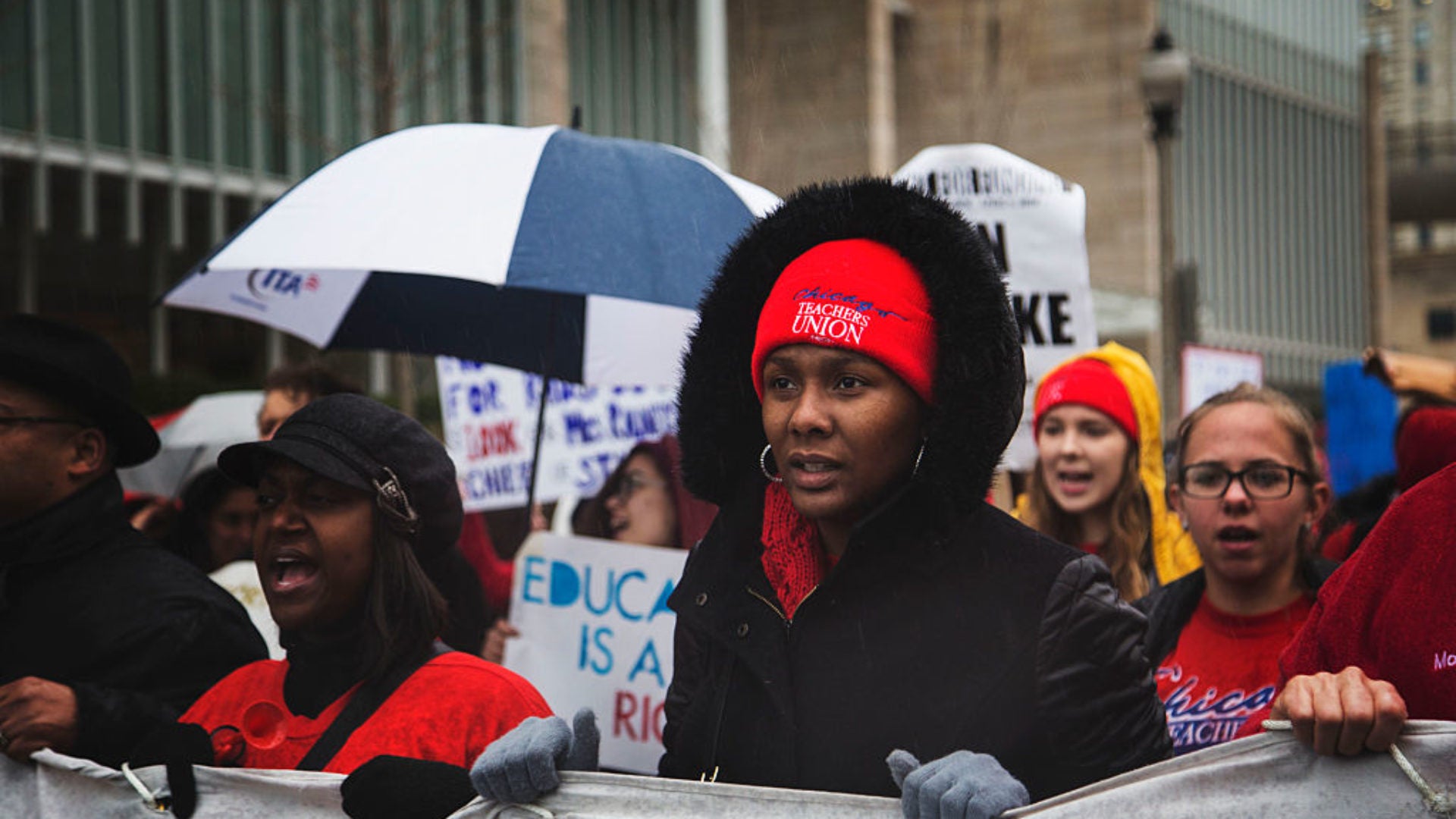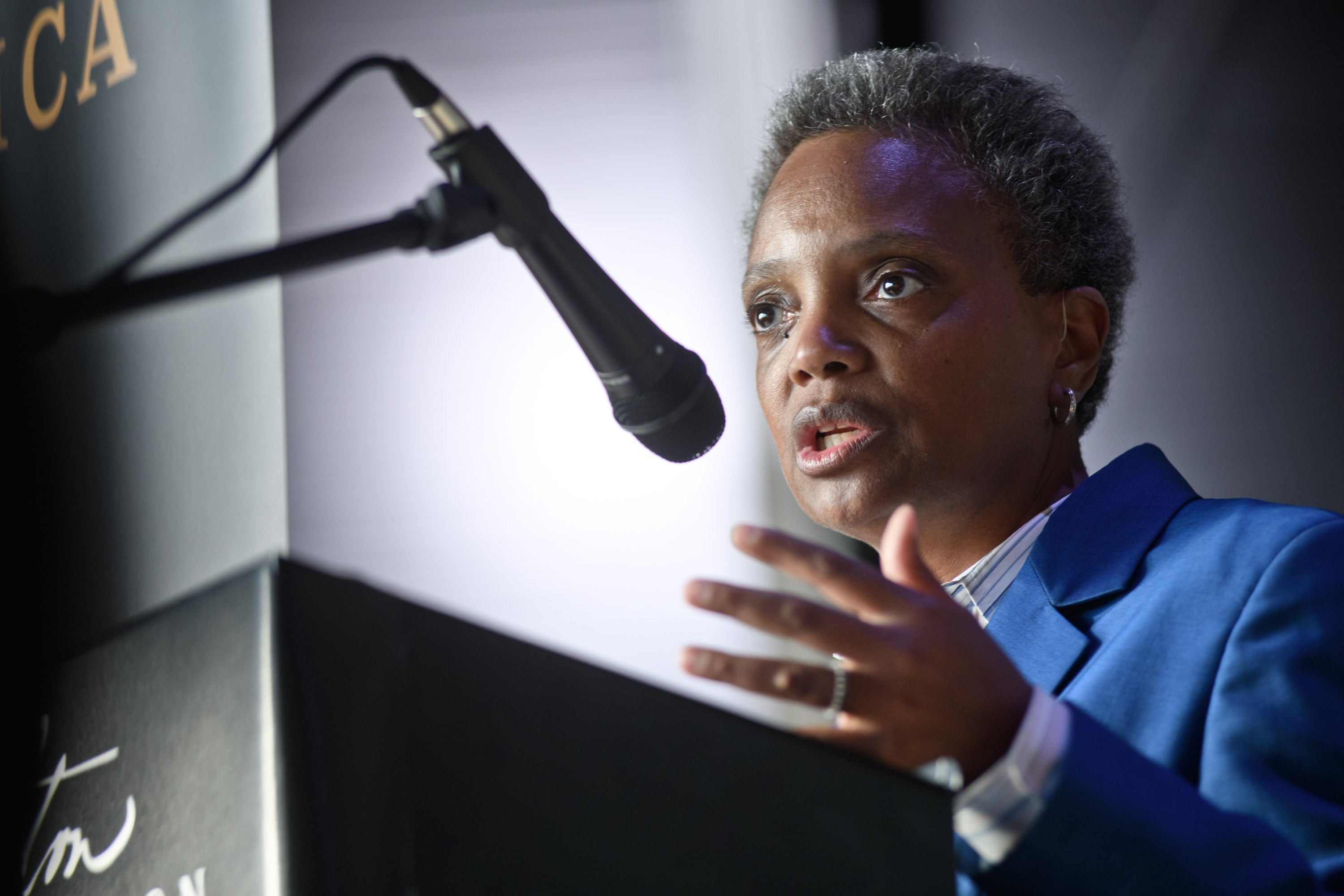
Chicago Mayor Lori Lightfoot blames teachers for holding up contract negotiations just 9 days before a strike date set by the Chicago Teachers Union, because they refuse to take affordable housing off the table, according to the Chicago Tribune.
According to a statement from Lightfoot on Tuesday, “[The union] is demanding that the city enact CTU’s preferred affordable housing policy as part of their contract.”
According to the Tribune, the mayor said that the union demanded that affordable housing be addressed instead of “providing a response to what she called the city’s comprehensive contract offer.”
In response, the CTU continued to advocate for the city’s nearly 17,000 homeless and unhoused students, saying Lightfoot knew that was always a part of the deal.
“We’re in an affordable housing crisis,” Lightfoot admitted Wednesday on Chicago Tonight. “I agree with those issues, but that’s not germane to the nuts and bolts of a CTU contract.”
Lightfoot continued, “We still have plenty of time to get a deal done, but we have to get a comprehensive response, a counterproposal, from the CTU to the big issues: compensation, insurance, benefits.”

CTU President Jesse Sharkey pushed back, WTTW reports, explaining that unhoused and homeless students is, in fact, a big issue, and that there is no effective way to address one issue without the other, because they are both intertwined.
“It’s germane when you think of the fact that there are over 16,000 students who are homeless in the Chicago Public Schools, and many of our schools have a hard time offering even basic services to those students,” Sharkey said. “It’s germane when you consider that … many of our members can’t afford housing in the city of Chicago.”
“Sixteen-thousand documented homeless students is a big deal, and we are leveraging our ability to have an enforceable contract to deal with that,” added Stacy Davis Gates, the CTU executive vice president.
Chicago Public Schools (CPS) reported serving 17,894 homeless and unhoused students during the 2017-18 school year. Of that number, 11.4 percent (2,041) were “unaccompanied youth,” defined as teens who are homeless and living on their own, without a parent or guardian; 10.7 percent, or 1,918 students, lived in shelters; 23.4 percent of students were diagnosed with disabilities or developmental delays.
An overwhelming 98.3 percent of homeless or unhoused students are students of color, with 81.2 percent being Black students and 15.6 percent being Latinx students.
In an interview with ESSENCE, Davis Gates, who for more than 10 years has, along with CTU members, demanded smaller classes, adequate school nursing coverage, and respect for students and educators on the south and west sides of the city, said that the number is more than likely higher than that now.
“We have a number of students who are just couch surfing,” the fierce advocate said. “We try to be conservative in our estimates, so that those who don’t support our fight don’t have an opportunity to say ‘gotcha,’ but the number is probably closer to 25,000 students.”
Speaking to how layered the structural inequities are, Davis Gates continued, “If you want to know if white supremacy is real, try negotiating a school contract where you are actually fighting for equity—class size, nurses, social workers and counselors, and school buildings. We have to have an answer that meets the needs of our students on a daily basis, and our leadership has failed us continuously.”
Davis Gates added, “Black people are being evicted from the city of Chicago. We live in a city that closed 50 schools, Black schools, at one time; now, juxtapose that with the Chicago Housing Authority sitting on about one billion dollars in surplus, while we’re struggling with a tragically high number of homeless students. We’re leveraging our power as educators, in this moment, to service students and bring attention to the gross inequities we must dismantle to push forth a bolder vision for our children and for this city.”

If no contract deal is reached between CPS and CTU, teachers will strike on Oct. 17. If that happens, Chicago Public Schools CEO Janice Jackson insisted that school buildings will remain open for parents, and that students will be offered a meal and “productive activity.”
Speaking to the hypocrisy of CPS offering students a meal, while simultaneously arguing that it’s not the appropriate time to negotiate for affordable housing, Davis Gates says that’s not enough.
“Our students need more than a safe space and warm meal,” she tells ESSENCE. “They need an opportunity to transcend poverty. And that happens through providing housing, smaller class sizes, school nurses, librarians, and counselors. Our imagination in this moment is a lot bolder than what our children have been offered. The way that Chicago functions now, the city depends on the adjustment of Black people to accept little to nothing when they deserve more. This contract seeks to transcend that, and we have the perfect opportunity to do so.”
And, frankly, Lightfoot and Jackson should not be roadblocks to justice and equity for Black students, Davis Gates tells ESSENCE.
“We have a mayor that ran on fighting for racial justice and racial equity,” she said. “We have a school leader who understands poverty and racism. There is zero reason why this can’t be done. Lightfoot and Jackson should want to create a just and equitable world where there are more little Black girls—and little Black boys—who are able to walk in their footsteps.”